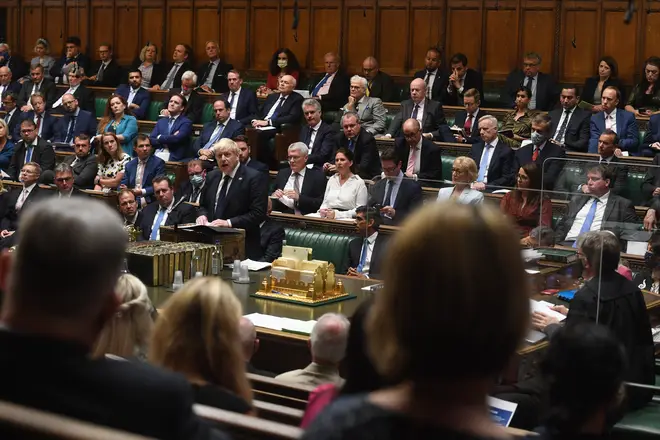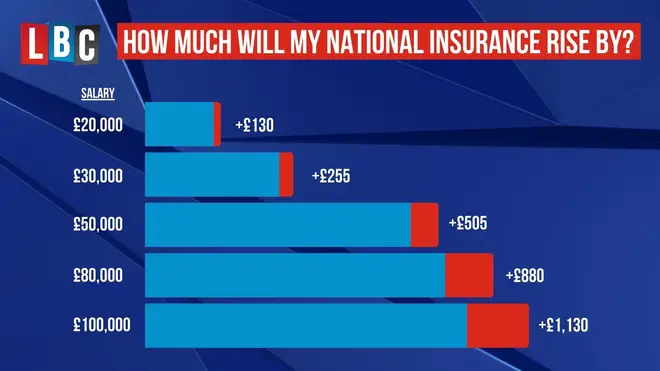
Paul Brand 10am - 12pm
8 September 2021, 07:27 | Updated: 8 September 2021, 09:55

Boris Johnson will attempt to convince Conservative MPs to back his plan to fix social care on Wednesday at a snap Commons vote called just one day after the manifesto-busting new policy was announced.
The Prime Minister took a political gamble on Tuesday as he scrapped an election promise by raising national insurance contributions, to deal with the backlog in the NHS and to deliver long-overdue reform of the social care system in England.
Tory opposition to the plans when first leaked was fierce, but any backbench rebellion appeared to have subsided by Tuesday as MPs provided little challenge to the PM as he presented his proposals to the Commons.
Read more: 'Read my lips': Labour mocks Boris Johnson with LBC video of him promising no tax rise
Read more: PM announces 1.25% 'manifesto breaking' tax hike to fund social care reform
But the plan - along with another manifesto-breaking announcement to temporarily suspend the "triple lock" on pensions - moves Mr Johnson away from his traditional position of low-tax Conservatism.
The PM also refused to give a firm commitment that taxes would not go up again - although he said he did not want that to happen.
"I certainly don't want any more tax rises in this Parliament," he told a press conference in Downing Street, flanked by Health Secretary Sajid Javid and Chancellor Rishi Sunak.
"If you want me to give that emotional commitment, of course that's the case."
He added: "There are not many people in the Conservative Party... who are more dedicated to cutting taxes, bearing down on taxes where we can, than the three people standing before you today, I absolutely assure you of the truth of that."
Mr Sunak added: "None of us standing here wants to be in a situation where we are raising taxes."

Boris Johnson breaks manifesto pledge and increases National Insurance
The Institute for Fiscal Studies (IFS) think tank said the announcements meant tax revenues will reach the highest ever share of national income, and combined with previous announcements will raise the tax burden in the UK to the highest-ever sustained level.
It will also mean taxes are at their highest since the second world war.
Ben Zaranko, Research Economist at the IFS, told LBC he thought the plan was "a broadly sensible and coherent way" of raising money to cover healthcare costs.
He also said that tax rises to cover health and social care costs were inevitable, saying: "Given the pressures of an ageing population that we already saw pre-pandemic, that have only been exacerbated by the experiences of the last 18 months or so, tax rises to pay for higher spending on health and social care was almost always going to happen eventually."
Read more: Second Tory manifesto pledge broken as pensions triple lock scrapped
Read more: Analysis: Why Boris Johnson broke his National Insurance pledge - and how it affects you
The Government's plan will see the introduction of a new health and social care levy, based on a 1.25 percentage-point increase in national insurance (NI) contributions - breaking a Tory commitment not to raise NI.
Under the new levy, a typical basic-rate taxpayer earning £24,100 would pay £180 more a year, while a higher-rate taxpayer on £67,100 would pay £715.

As well as providing extra funding for the NHS to deal with the backlog built up during the Covid-19 pandemic, the new package of £36 billion over three years will also reform the way adult social care in England is funded.
A cap of £86,000 on lifetime care costs from October 2023 will protect people from the "catastrophic fear of losing everything", Mr Johnson said.
Read more: Boris Johnson refuses to rule out more tax hikes after National Insurance rise
Read more: National Insurance rise: How much more will you need to pay?
The Government will fully cover the cost of care for those with assets under £20,000, and contribute to the cost of care for those with assets between £20,000 and £100,000.
Scotland, Wales, and Northern Ireland will receive an extra £2.2 billion a year as a result - around 15 per cent more than they will contribute through the levy - creating what ministers described as a "Union dividend" of £300 million.

Social care: LBC's Matthew Thompson reacts to PM press conference
Health Secretary Sajid Javid clashed with LBC's Nick Ferrari on Wednesday over the tax rise.
Nick challenged Mr Javid about £350m promised to the NHS as a result of Brexit.
"We were told that if we left the European Union we’d be saving £350m a week that would go to the NHS… that’s tens of billions of pounds we’ve saved. Where is it?"
"As we’ve left the EU it happened at the same time as the global pandemic and that money – and much, much more – has gone into the health and care service," said Mr Javid.
Read more: 'Where's the £350m a week for the NHS we were promised when we left the EU?'
He said that the money from had gone into handling the pandemic including the vaccine programme, PPE provision and test & trace.
"We’re not hiding any of this money, it’s going into the health and care service," Mr Javid went on.
"It’s being used a lot of it rightly to deal with the pandemic right now. But we need to plan for the long term and that’s what yesterday’s announcecment was about."

Things got heated when Nick challenged the Health Secretary
Mr Johnson is expected to address the influential 1922 committee of backbench Tory MPs ahead of the vote on Wednesday.
Reports suggested some Cabinet members had privately challenged Mr Johnson when he unveiled his plan to them on Tuesday morning, but none have resigned over the principle.
In the Commons, Conservative backbencher Richard Drax said: "As Conservatives, broken pledges and tax rises should concern us.
"Our finances are in a perilous state. Surely a radical review of the NHS is needed if this money is not to go and disappear into another blackhole?
"Does my right honourable friend agree with me that the Conservative way to raise revenue is to lower taxes not raise them?"
The Prime Minister responded that he did agree with "that general proposition", but that the pandemic had meant the rise was necessary.
Read more: Rishi Sunak to outline plans to balance the books in Autumn budget next month
Read more: As it happened: Boris Johnson announces 1.25% social care tax rise

Care provider chief denigrates PM's health and social care plans
Another backbencher was unhappy with the proposals themselves.
Stephen McPartland indicated that he could not support the Government's plan for social care without more detail.
The MP for Stevenage said on Twitter: "The new health and social care levy provides no new funding for social care for at least three years. No money for living costs, only personal care costs. Selling your home is just deferred. It is a tax on jobs.
"I need much more detail to even consider supporting it."
Watch: PM admits controversial social care tax hike 'breaks manifesto commitment'
Labour have also said they will vote against the plans, with the party using an LBC video of Boris Johnson promising not to raise taxes on their social media.
"Read my lips," said Mr Johnson in the video, from November 2019.
"We will not be raising taxes."
Labour leader Sir Keir Starmer used the clip to mock the Prime Minister, saying in the House of Commons: "Read my lips - the Tories can never again claim to be the party of low tax."
The new Health & Social Care Levy provides no new funding for social care for at least 3 years. No money for living costs, only personal care costs. Selling your home is just deferred. It is a tax on jobs. I need much more detail to even consider supporting it. https://t.co/8w1V0FQLB3
— Stephen McPartland (@SMcPartland) September 7, 2021
The Liberal Democrats have also said they will oppose the measures in Parliament on Wednesday, but former Health Secretary Jeremy Hunt said he thought the Government would win the vote.
Read more: Labour to oppose Boris Johnson's 'unfair' national insurance increase
Read more: PM's controversial social care tax hike given green light by Cabinet
A YouGov poll found voters were split in their views on the national insurance rise, with 44 per cent in favour and 43 per cent opposed,
Among Conservative voters 59 per cent supported the rise.
Only a third of Labour voters backed it.